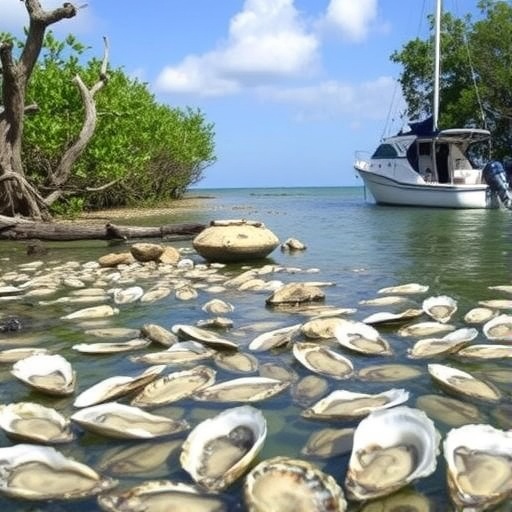Emerging research from the University of Central Florida reveals a complex ecological interaction threatening the delicate balance of Florida’s coastal ecosystems. While the resurgence of mangrove populations has long been celebrated as a victory for coastal restoration, this growth appears to come at a hidden cost to native oyster reefs. Graduate researcher Katherine Harris and Pegasus Professor Linda Walters have uncovered evidence that mangroves are driving acidification in oyster reef sediments, accelerating shell dissolution and potentially undermining the very services these reefs provide.
Oyster reefs have long been recognized as ecological keystones in subtropical estuarine environments, offering vital ecosystem services including water filtration, habitat for diverse species, and coastal protection. In contrast, mangroves—salt-tolerant trees thriving in intertidal zones—have surged in numbers due to restoration efforts combined with favorable climate patterns. However, mangroves’ biogeochemical influence alters sediment chemistry, acidifying substrates where oysters calcify their shells. Such acidification triggers a cascade of detrimental effects, fundamentally challenging reef integrity.
The investigation centered on sediment samples and oyster shell analyses in Mosquito Lagoon and Indian River Lagoon. Researchers deployed cleaned oyster shells in mesh bags across gradients of mangrove density to isolate the impact of sediment acidity on shell stability. Over two years, shells in mangrove-dominated areas lost approximately 8% of their mass, a stark contrast to the 1% loss observed in oyster reefs with minimal mangrove presence. Particularly alarming were instances of 40% mass loss in extreme acidification scenarios, highlighting the vulnerability of oyster calcium carbonate structures under these conditions.
Mangrove encroachment, the team notes, is not an antagonistic takeover but rather an ecological shift characterized by mangroves’ natural capacity to modify their environment. Mangrove roots and leaf litter contribute organic acids, enhancing sediment acidity—a process that, while beneficial for mangrove establishment, inadvertently stresses shell-forming organisms like oysters. This phenomenon underscores a crucial ecological paradox: two coastal species essential for ecosystem resilience may be at odds due to intrinsic biogeochemical processes.
The consequences of declining oyster reef health extend far beyond shell integrity. Each oyster filters approximately 20 gallons of water daily, maintaining water clarity essential for seagrasses and other aquatic vegetation. These filtration services also underpin food webs supporting fish, crab, and bird populations. Furthermore, oyster reefs act as natural breakwaters, attenuating wave energy and buffering shorelines against erosion and storm surge. As reefs degrade and shrink, the protective services they render could diminish, leaving coastal communities more susceptible to climate-driven hazards.
Live oysters may exhibit some physiological resilience, potentially allocating energy to counteract acidification by enhancing shell calcification. Yet, this defensive mechanism is energetically costly and may compromise growth and reproductive success. The long-term viability of oyster populations under elevated acidity remains uncertain, emphasizing the need for holistic management strategies that acknowledge these biochemical trade-offs.
Intriguingly, this research sheds light on the nuanced spatial dynamics within coastal systems. Mangroves typically grow landward of oyster reefs, but recent observations of mangrove encroachment onto oyster reef “islands” present a novel ecological scenario warranting further study. The interplay between sediment chemistry, species distribution, and ecosystem function remains poorly understood, representing a fertile ground for multidisciplinary inquiry.
The University of Central Florida’s Coastal and Estuarine Ecology Lab (CEELAB), under Walters’ leadership, integrates classroom education with hands-on ecological research, advancing understanding of coastal restoration challenges. CEELAB’s innovative programs include nurturing mangrove seedlings in local classrooms, fostering community involvement in ecosystem stewardship. With two decades of oyster restoration research, the lab is uniquely positioned to spearhead investigations into mangrove-oyster interactions.
The research team emphasizes the urgency of re-evaluating restoration approaches to reconcile the dual objectives of supporting mangrove proliferation and sustaining oyster reef health. Balancing these priorities requires nuanced strategies that consider the ecological feedbacks linked to sediment acidification and biogeochemical cycling. Harris advocates for a comprehensive understanding that both habitat types provide indispensable ecosystem services and that neither should be compromised.
This pioneering study also highlights the utility of incorporating cleaned shell experiments onto natural reefs to isolate chemical influences from biological variability inherent in live populations. Such methodological rigor provides clarity on the distinct impacts of changing sediment chemistry devoid of confounding physiological responses, thereby refining current ecological models.
As coastal landscapes face increasing pressures from climate change and anthropogenic activity, insights from this research offer a critical perspective on ecosystem resilience and adaptive management. Restoration efforts must integrate considerations of species interactions and sediment chemistry to safeguard multifunctional coastal habitats effectively.
By illuminating the subtle but significant challenges posed by mangrove-driven acidification, this study fosters a more informed dialogue among ecologists, conservationists, and resource managers. Ultimately, the goal is to ensure that Florida’s vibrant coastal ecosystems—where mangroves and oysters once coexisted in dynamic equilibrium—continue to deliver their invaluable services in an era of environmental uncertainty.
Subject of Research: Mangrove-driven acidification effects on intertidal oyster reefs and shell dissolution in subtropical estuaries
Article Title: Mangrove-driven acidification and shell dissolution on intertidal oyster reefs in a subtropical estuary
News Publication Date: 24-Jul-2025
Web References:
DOI: 10.3354/meps14894
Image Credits: University of Central Florida
Keywords: Ecology, Aquatic ecology, Ecosystems, Marine biology, Plant biochemistry, Trees, Mollusks, Coastal zones




